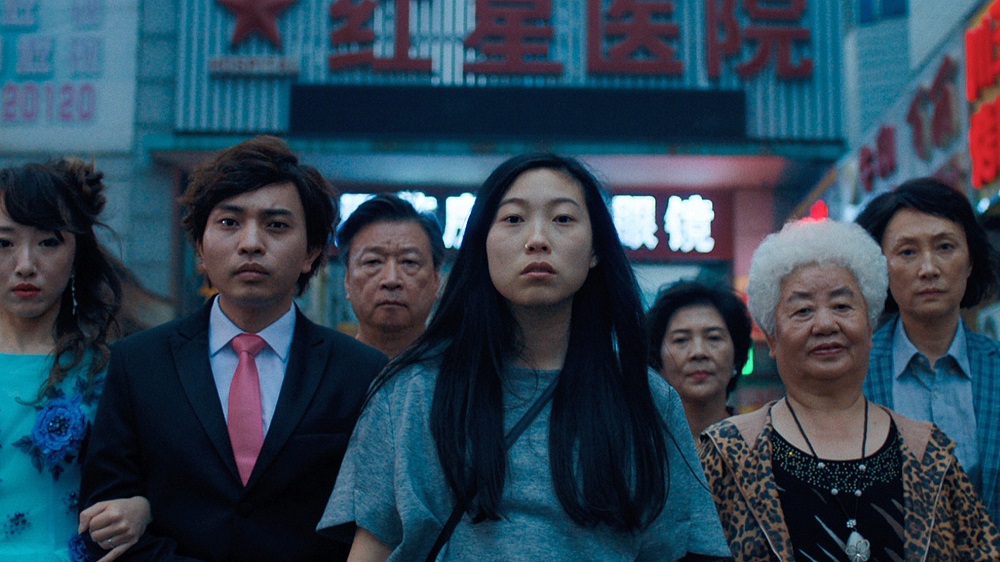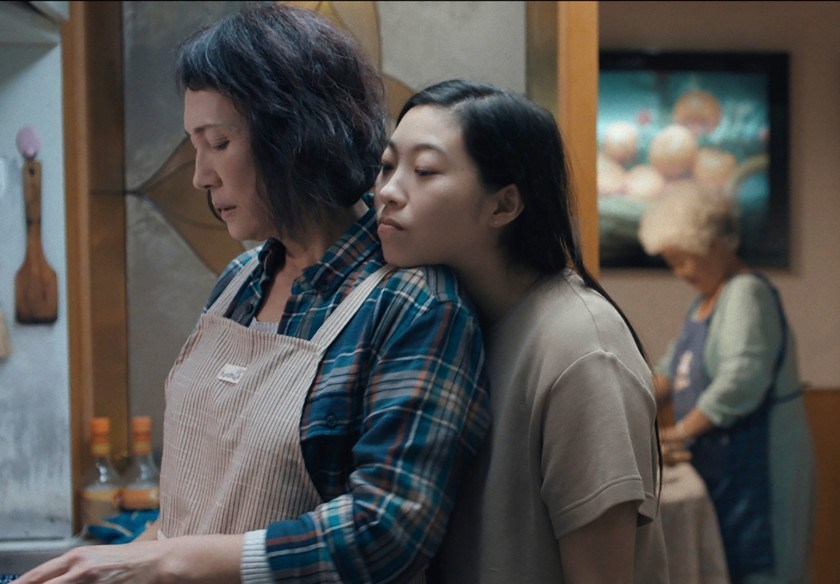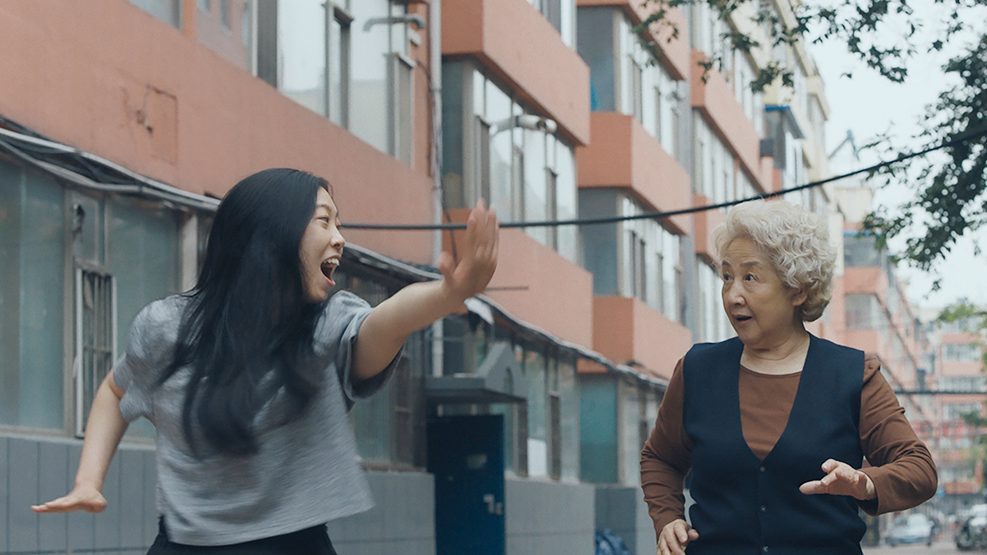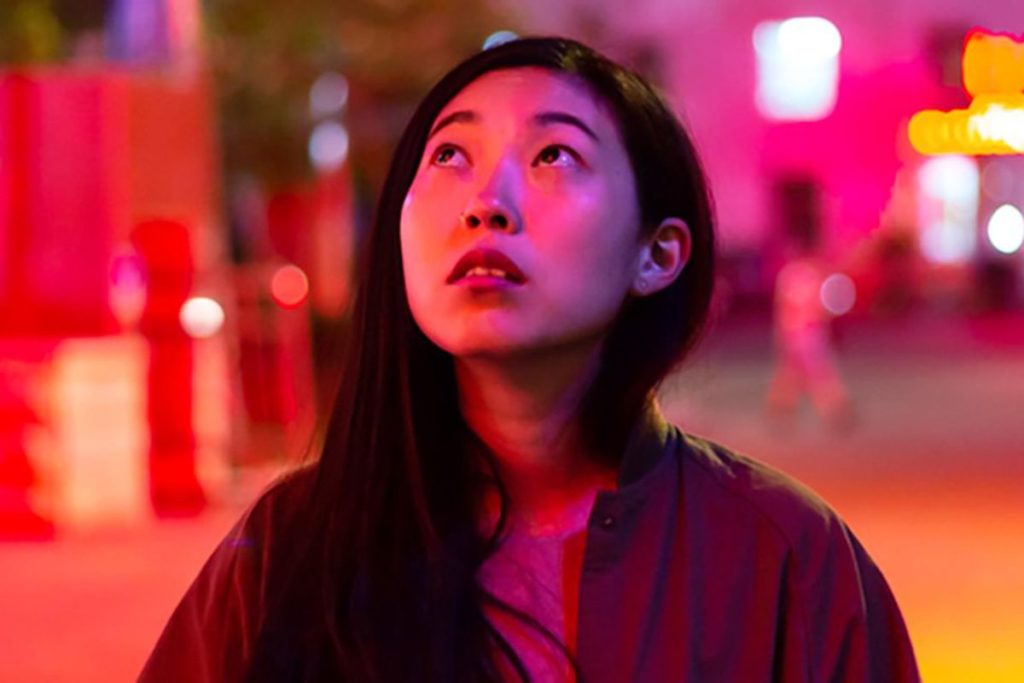
The Farewell might have been a minor movie, if it didn’t plainly house such major talents. With its gentle tone and delicate sense of scale, it’s so intimate, it could have verged on flimsy. But writer-director Lulu Wang, making her second feature, invests the melancholy story with grace notes of lyricism that give it some stylistic heft. She’s also found the perfect star in Awkwafina, the rapper and comedienne who here makes a seamless transition to more somber material. It’s a heavy story told with a beautifully light touch.
The movie opens with a title card that reads “based on an actual lie”, establishing both its autobiographical bona fides—Awkwafina’s Billi is in many ways a stand-in for Wang—and its cheeky wit. But the falsehood at its center does more than just drive the slender plot; it becomes the foundation on which Wang builds the film’s intriguing explorations of culture, geography, and identity. And The Farewell, despite its narrow scope and quiet bearing, ends up operating on multiple levels. It’s a human melodrama that doubles as an empathetic treatise on humanity.
When we first meet Billi, her concerns are far more prosaic. A Chinese immigrant who’s spent most of her life in New York City, her primary focus is obtaining a scholastic fellowship, which would allow her to pursue a career in an unspecified discipline, and maybe even pay her rent. But when she heads to the house of her parents, Jian (Diana Lin) and Haiyan (Tzi Ma), to do laundry and nab a free meal, she receives some disturbing news: Her grandmother, still living in China and referred to only by the affectionate term Nai Nai (Zhao Shuzhen), has been diagnosed with lung cancer and only has a few months to live. That’s upsetting enough, but what really shakes Billi is her parents’ declaration that their family has decided to shield Nai Nai’s illness from her—her sister assures her that a recent medical scan revealed only “benign shadows”—the better to ensure she lives out her few remaining days in peace.

Is this outrageous? Compassionate? Selfish? Kind? Billi is initially convinced that her family’s collective deception is an act of cruelty, and that they have a moral obligation to tell Nai Nai the truth. The Farewell spends the majority of its running time probing the strength of her convictions and considering the viability of various counterarguments. That it never arrives at a definitive answer is hardly a spoiler. Wang is less a preacher than a prodder; rather than passing judgment, she uses the film’s premise as a vehicle to illuminate our connections and question our assumptions. She also examines how families can be linked by blood but nevertheless divided by circumstance—the naturally occurring schisms between old and young, between East and West, between fashionable and traditional.
As a Chinese-born woman whose tastes and mannerisms are thoroughly American, Billi tends to straddle these boundaries. She also serves, at least for certain viewers of limited Asian acumen (not that I have anyone in mind), as something of an audience surrogate. Traveling to Changchun—the ostensible occasion is a wedding between her shy cousin (Chen Han) and his polite fiancée (Aoi Mizuhara), but the real reason is for everyone to spend time with Nai Nai while they still can—Billi immerses herself into the Pearl of the Orient with a mixture of confusion and curiosity. She may chafe against her family’s rigidity and orthodoxy, but she also opens herself up to this brave old world, absorbing its complexities in venues as varied as massage parlors, cemeteries, and restaurants. Both Wang’s camera and her other characters tend to behave as benevolent tour guides, welcoming us to a foreign land—and a cinematic landscape—that teems with the rich verisimilitude of everyday life.

In terms of plot, not that much happens in The Farewell, which is both an indictment of its energy and a testament to its fine-grained realism. I recognize that this is a gauche and decidedly American complaint, but while the movie is sharply observed, it isn’t especially entertaining. Some of this stems from its peculiar size, which is somehow both small and sprawling; though the film is modest in scope, there are quite a few secondary characters—cousins, aunts, friends—whom we don’t get to know very well. And Wang’s calm, assured direction can occasionally make things feel sedate.
At the same time, The Farewell proceeds with such attention and intelligence that it regularly turns its flaws into virtues. The peripheral members of Billi’s vast extended family may not be especially well-defined, but there is nevertheless the sense that they have their own messy lives off screen, and that they could have served as the center of their own, equally astute movie. And Wang’s refusal to shake things up with plot contrivances—suffice it to say that there are no momentous mahjong games played in the final act—lends the film a measure of truth.
She also smuggles in bits of aesthetic flair, goosing our visual interest in a movie that mostly plays out in cluttered kitchens, dimly lit hotels, and nondescript hospital rooms. There’s a hypnotic scene midway through the film where the entire family goes out to dinner and sits at a large circular table; as they debate culture and politics—Jian pointedly notes that, while some of her in-laws hold dubious views of America, they don’t hesitate to export their children to the United States for college—an inner wheel embedded into the table rotates slowly, allowing the diners to help themselves to heaping plates of appetizing food. It’s a seemingly trivial detail, but it invisibly brings us closer to the characters and their way of living. And in the movie’s most dynamic sequence, Wang shoots Billi as she sprints down the sidewalk, a dolly fluidly tracking her in full, breathless flight.

That scene allows Awkwafina to unleash some of her natural vivacity in what is otherwise an expertly internalized performance. As the stoic Jian tells it, Billi is incapable of hiding her emotions, a trait that risks tipping Nai Nai off that something is wrong. It’s a fair charge, but it also means that Awkwafina must constantly convey fear, trepidation, and sadness. The actor, who last year established her natural on-screen charisma in Ocean’s Eight and Crazy Rich Asians, rises to the challenge brilliantly, her hunched posture and searching eyes suggesting a woman struggling to comprehend her place in her family and in the world. As Billi’s parents, Lin and Ma are similarly good, and some of the film’s most rewarding scenes involve Billi simply talking with her mother and father, conversations that are unpredictable for the way the characters both criticize and support one another.
Much like Edward Yang’s Yi Yi, The Farewell uses the plight of ordinary people as a canvas to study broad themes about family and nationality. Yet unlike that big, novelistic picture, this one is closely drawn, an approach that both limits its potential and sharpens its impact. There’s mundanity in this movie, and beauty, too. And despite being shrouded by the threat of death, The Farewell is ultimately life-affirming. That’s most apparent in its lovely final scene, a touching, butterfly effect-inspired moment that silently bridges oceans and years. It’s one of the many tranquil flourishes in The Farewell, a movie about a lie that is rigorously, wonderfully honest.
Grade: B
Jeremy Beck is the editor-in-chief of MovieManifesto. He watches more movies and television than he probably should.
